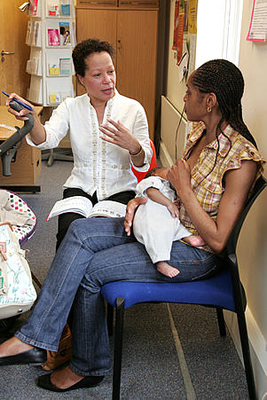Promoting Attachment and Wellbeing Part 1: Concepts


This session is the first of two in this series focusing on attachment and wellbeing. This first session will provide an overview of attachment whilst the second (Positive Parenting and Parenting Issues/Promoting Attachment and Wellbeing Part 2: Practice) will explore the range of attachment-based interventions that help to foster secure attachment.
Learning objectives
By the end of this session you will be able to:
- Define ‘attachment’
- Explain how attachment theory was developed
- Provide an overview of the essential features of attachment theory
- Summarise the key characteristics of the four attachment types
- Identify links between attachment and health and wellbeing
- Understand the relevance of attachment theory to clinical practice
This sesssion aims to help learners understand the key features of attachment theory and its relevance to their work with families particularly with regard to the way that parent-infant relationships develop and the implications of those interactions for the future health and wellbeing of the child.
Before commencing this session you should complete the following HCP session:
- Healthy Child Programme Basics/Introduction to the Healthy Child Programme (402-0016)
Having spent the majority of her working life as a health visitor, Catherine then worked as a nurse consultant in perinatal and infant mental health in a Mental Health Trust for 10 years. Catherine was a member of the guideline development group for the NICE guideline for the management of Depression in Children and was involved in the launch and implementation plan for the 2007 NICE guideline for Antenatal and Postnatal Mental Health. Catherine has always been interested in creating learning opportunities for health professionals that are interesting, accurate, informative and fun. In 2013, in collaboration with colleagues, she was involved in setting up LCB Resources Ltd, a company that produces interactive games for health and social care practitioners. Catherine is currently a full-time PhD student at Oxford Brookes University and is investigating the role of health visitors in supporting women with perinatal mental health issues.


- End of Life Care | Specialist care | Tracheostomy ...
- Posted By eIntegrity Healthcare e-Learning
- Posted Date: 2025-01-10
- Location:Online
- This session covers basic knowledge required to keep patients safe if they have a tracheostomy and laryngectomy, including:<br><br>• Humidification<br>• Stoma care<br>• Securing the tube<br>• Maintenance: suction, inner tubes and c
- End of Life Care | Specialist care | Palliative ca...
- Posted By eIntegrity Healthcare e-Learning
- Posted Date: 2025-01-10
- Location:Online
- This session will discuss the features of some of the more common neuromuscular disorders, the physical and psychological issues which present with such disorders and the current practice for symptom control in palliative care.
- End of Life Care | Specialist care | Non-invasive ...
- Posted By eIntegrity Healthcare e-Learning
- Posted Date: 2025-01-10
- Location:Online
- Non-invasive ventilation (NIV) is an intervention which can improve both quality of life and survival for patients with motor neurone disease (MND). This session outlines the evidence base and practicalities of this important treatment option for patients
- End of Life Care | Specialist care | Intrathecal d...
- Posted By eIntegrity Healthcare e-Learning
- Posted Date: 2025-01-10
- Location:Online
- This session provides an overview of intrathecal drug delivery (ITDD) for the management of cancer pain. It aims to enhance the understanding of which patients may benefit from this approach and the principles which govern the safe use of ITDD systems. It
- End of Life Care | Specialist care | I'm not lovea...
- Posted By eIntegrity Healthcare e-Learning
- Posted Date: 2025-01-10
- Location:Online
- This session explores the concerns patients and their partners may have about intimacy and sex when approaching the end of life. It examines the challenges this raises for professionals and how most effectively to approach the topic. This session was revi







